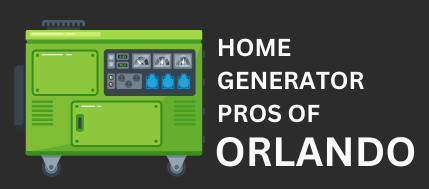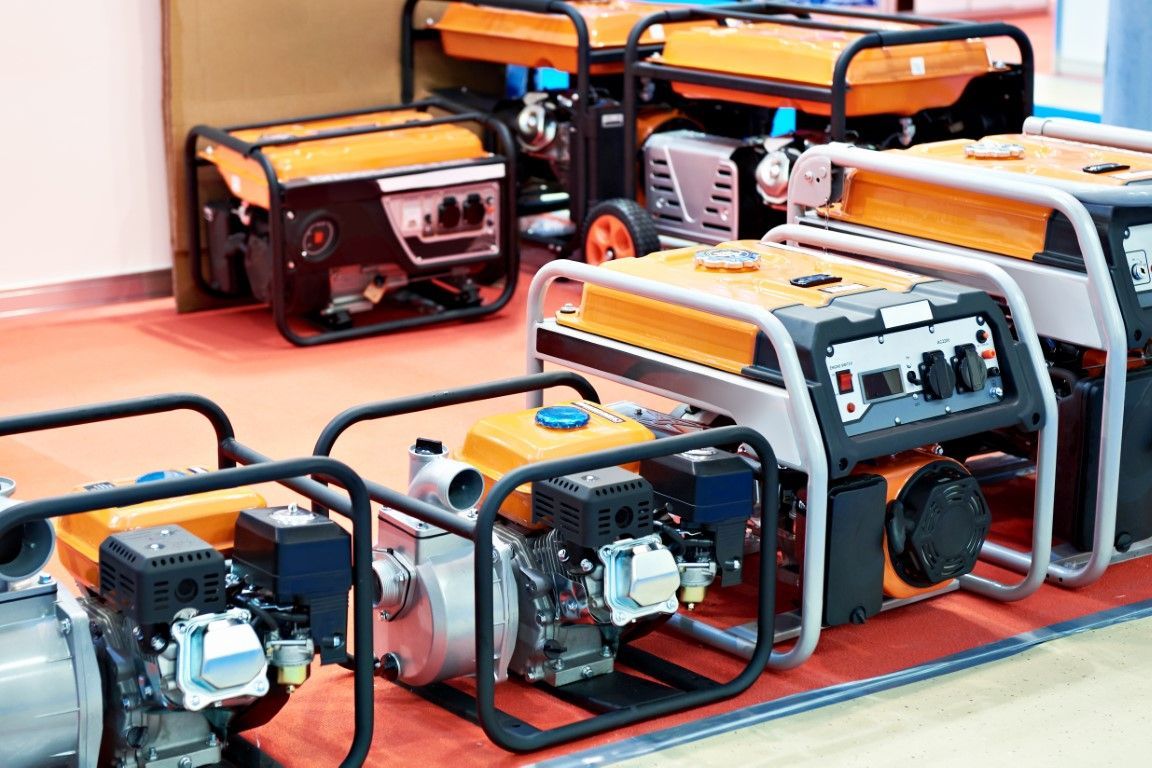
Electric Generators in Orlando FL
An electric generator is a device that converts mechanical energy into electrical energy. Its primary function is to provide power when there is an interruption in the main electrical supply. Generators are essential for maintaining power during outages, supporting critical infrastructure, and ensuring the operation of various equipment. Weather conditions such as hurricanes and storms can cause frequent power outages, having a reliable generator is crucial for both residential and commercial needs.
Different Types and Key Features to Consider
There are several types of electric generators, each suited for different needs. Portable generators are compact and easy to move, making them ideal for temporary use or small-scale power needs. Standby generators, on the other hand, are permanently installed and automatically provide power during an outage, offering a more robust solution for continuous power supply.
Key components of an electric generator include the engine, alternator, fuel system, and control panel. The engine generates mechanical power, which the alternator converts into electrical power. The fuel system provides the energy needed to run the engine, and the control panel allows users to monitor and manage the generator’s operation.
How It Works
Electric generators operate on the principle of electromagnetic induction. The engine turns a rotor within the alternator, creating a rotating magnetic field. This rotating field induces an electric current in the stator, which is then transferred to the electrical outlets. The generator’s control panel regulates the flow of electricity, ensuring a stable and safe power supply.

We will get back to you as soon as possible.
Please try again later.
Maintenance and Safety Tips
Regular maintenance is essential for the reliable operation of electric generators. Routine tasks include checking and changing the oil, inspecting the fuel system, and cleaning the air filter. It's also important to ensure that the generator is running smoothly and that there are no signs of wear or damage. Safety is paramount when operating a generator. Always use the generator outdoors in a well-ventilated area to avoid carbon monoxide buildup. Keep the generator dry and away from flammable materials. Ensure that all connections are secure and that the generator is properly grounded to prevent electrical hazards.
Environmental and Efficiency Considerations
Generators can have varying impacts on the environment depending on their fuel source and efficiency. Diesel and gasoline generators emit exhaust gases that contribute to air pollution. To minimize environmental impact, consider generators that use alternative fuels, such as propane or natural gas, which are generally cleaner. Efficiency is another important factor. Modern generators are designed to be more fuel-efficient, reducing operational costs and environmental impact. Look for models with high efficiency ratings and features like automatic load adjustment to optimize fuel usage.
Applications and Uses
Electric generators have a wide range of applications. In residential settings, they provide backup power for essential appliances and systems, such as refrigerators, heating, and air conditioning. In commercial settings, generators ensure the operation of critical equipment and maintain business continuity during power outages. Generators are also used in construction sites, outdoor events, and emergency response situations. Their versatility makes them a valuable tool in many scenarios where a reliable power source is needed.
Choosing the Right Electric Generator
Selecting the right generator depends on your specific needs. Consider factors such as power capacity, fuel type, and portability. For residential use, a portable generator with sufficient wattage to cover essential appliances may be adequate. For commercial or high-demand applications, a standby generator with a larger power capacity and automatic transfer switch might be necessary. Evaluate the generator’s fuel efficiency, noise level, and ease of maintenance. Reading customer reviews and consulting with professionals can help you make an informed decision.
Troubleshooting Common Issues
Generators can experience various issues over time. Common problems include difficulty starting, inconsistent power output, and excessive noise. If the generator fails to start, check the fuel level, battery charge, and ensure that all connections are secure. For power output issues, inspect the alternator and ensure that the load is within the generator’s capacity. Excessive noise can be caused by loose components or an improperly adjusted engine. Regular maintenance and inspections can help prevent and address these issues promptly.
For expert advice on selecting, maintaining, or troubleshooting your
electric generator in Orlando, FL, don’t hesitate to reach out. Our team of professionals is here to provide you with the information and support you need to ensure that your generator operates smoothly and efficiently. Contact us today to learn more about our services and how we can assist you with your power needs.
Electric Generators for Emergency Situations: What Features Matter Most?
In today’s world, having a reliable backup power source is crucial, especially when emergencies strike. Electric generators are indispensable during power outages caused by natural disasters, blackouts, or other unexpected events. They can keep your essential appliances running and provide a sense of security. However, with so many models and features available, choosing the right generator can be overwhelming. Understanding what features are most important can help you make an informed decision and ensure you’re prepared for any situation.

Choosing the right electric generator for emergency situations is crucial for ensuring you’re prepared for power outages and other emergencies. By considering factors such as power output, fuel type, runtime, portability, noise level, ease of use, safety features, and brand reputation, you can find a generator that meets your needs and provides reliable backup power.
Power Output
The most critical factor when choosing a generator is its power output. This is measured in watts and indicates how much power the generator can produce. For emergency situations, you’ll need to determine the wattage required to run essential appliances like refrigerators, heaters, and medical equipment. A generator with a higher wattage can support more devices simultaneously, providing greater flexibility. It’s advisable to calculate the total wattage of your essential appliances and choose a generator that exceeds this requirement to account for any power surges.
Fuel Type and Efficiency
Generators come in various fuel types, including gasoline, diesel, propane, and natural gas. Each fuel type has its pros and cons. Gasoline generators are widely available and easy to refuel, but they have a shorter shelf life and require regular maintenance. Diesel generators are durable and efficient but can be noisy. Propane and natural gas generators are cleaner and often quieter but require a steady fuel supply. Consider the availability of fuel and how it aligns with your needs when choosing a generator. Efficiency in fuel consumption can also impact your operating costs during extended outages.
Runtime and Tank Size
Runtime refers to how long a generator can run on a single tank of fuel. This is crucial during emergencies when power might be out for an extended period. Look for a generator with a large fuel tank or a high runtime to ensure you have enough power without frequent refueling. Generators with longer runtimes can provide continuous support, which is essential for long-term emergencies. Check the generator’s specifications to understand its average runtime and plan accordingly.
Portability and Size
The size and portability of a generator are important considerations, especially if you need to move it during an emergency. Portable generators are generally smaller and easier to transport, making them ideal for use in different locations or if you need to evacuate. However, ensure that the generator’s size and weight are manageable for your situation. Stationary generators, while larger and more powerful, may require professional installation but provide a permanent solution for home power backup.
Noise Level
Generators can be noisy, which might be a concern if you need to operate it for long periods or in close proximity to neighbors. Noise levels are measured in decibels (dB), and quieter generators are available for those who prefer minimal disturbance. Consider a generator with a lower noise rating if noise is a concern, especially if you live in a densely populated area. Many modern generators are designed to operate quietly without sacrificing performance.
Ease of Use and Maintenance
A generator should be user-friendly and easy to maintain, particularly during emergencies when you need it to be operational quickly. Look for features like electric start, which simplifies starting the generator, and easy-to-access maintenance points for regular upkeep. Regular maintenance is essential to ensure the generator remains reliable when needed. Review user manuals and consider customer reviews to gauge the ease of use and maintenance for the models you’re interested in.
Safety Features
Safety is paramount when dealing with generators, as they can pose risks if not used correctly. Look for safety features such as automatic shutdown systems that prevent overheating or low oil levels. Circuit breakers are also important to protect the generator and your appliances from power surges. Additionally, consider models with carbon monoxide detectors to prevent harmful gas buildup. Ensuring that your generator has these safety features can help prevent accidents and ensure safe operation.
Brand Reputation and Warranty
Brand Reputation and Warranty
The reputation of the brand and the warranty offered can provide additional peace of mind. Established brands often have a track record of reliability and customer support. A good warranty can protect your investment and provide support in case of defects or issues. Research different brands and read customer reviews to understand their reliability and the quality of their products. A solid warranty also indicates the manufacturer’s confidence in their product.
If you have any questions or need assistance in selecting the best generator for your situation, feel free to contact us today. Our experts are here to help you make the right choice and ensure you’re equipped to handle any emergency with confidence.
Fuel Types for Electric Generators: Pros and Cons of Each
Electric generators are essential for providing backup power during outages and ensuring a consistent energy supply in various situations. Choosing the right generator involves understanding the different fuel types available and their respective advantages and drawbacks. This guide explores the main fuel options for electric generators—gasoline, diesel, propane, and natural gas—highlighting their pros and cons to help you make an informed decision based on your needs.
Pros:
- Widely Available: Gasoline is easily accessible at most gas stations, making it convenient to refuel.
- Lower Initial Cost: Generators that run on gasoline are often less expensive to purchase compared to other fuel types.
- Easy Start: Gasoline generators typically have a simple start mechanism, often with a pull-start or electric starter.
Cons:
- Shorter Storage Life: Gasoline has a relatively short shelf life and can degrade over time, potentially causing starting issues if not used within a few months.
- Higher Maintenance: Gasoline generators may require more frequent maintenance and cleaning due to the buildup of residue and the potential for carburetor issues.
- Safety Concerns: Gasoline is highly flammable and poses safety risks if not handled properly or stored safely.
Pros:
- Durability and Longevity: Diesel generators are known for their durability and can run for longer periods, making them ideal for heavy-duty applications.
- Fuel Efficiency: Diesel engines are more fuel-efficient compared to gasoline engines, providing longer run times and reduced fuel costs over time.
- Lower Maintenance: Diesel generators typically require less maintenance due to fewer moving parts and the absence of spark plugs.
Cons:
- Higher Initial Cost: Diesel generators are generally more expensive to purchase upfront compared to gasoline models.
- Noise and Vibration: Diesel generators tend to be noisier and produce more vibration, which might be a concern in residential areas or quiet environments.
- Fuel Storage and Handling: Diesel fuel can be more challenging to store and handle, requiring proper facilities and safety measures.
Pros:
- Clean Burning: Propane is a clean-burning fuel, producing fewer emissions and less pollution compared to gasoline and diesel.
- Long Shelf Life: Propane has an indefinite shelf life, making it a good choice for long-term storage and emergency preparedness.
- Quiet Operation: Propane generators generally operate more quietly than gasoline or diesel generators.
Cons:
- Fuel Availability: Propane may not be as readily available as gasoline or diesel, especially in remote areas, which can be a drawback in emergencies.
- Higher Operating Costs: Propane can be more expensive than gasoline or diesel, leading to higher operational costs over time.
- Lower Energy Density: Propane has a lower energy density compared to diesel, which may result in shorter run times for the same volume of fuel.
Pros:
- Continuous Supply: Natural gas provides a continuous fuel supply through pipelines, eliminating the need for fuel storage and refueling.
- Clean and Efficient: Natural gas burns cleanly and efficiently, producing lower emissions and offering a more environmentally friendly option.
- Lower Operating Costs: Natural gas is often more cost-effective than gasoline or propane, leading to lower operating expenses over time.
Cons:
- Dependency on Infrastructure: Natural gas generators rely on a stable gas supply, which may not be available during certain emergencies or outages.
- Higher Installation Costs: Installing a natural gas generator may involve higher costs for the necessary infrastructure and connections to the gas supply.
- Limited Portability: Natural gas generators are typically less portable compared to gasoline or propane models, as they require a connection to the gas line.
Choosing the right fuel type for your electric generator depends on various factors, including your specific needs, budget, and the availability of fuel sources. Understanding the pros and cons of each fuel type can help you make an informed decision and ensure you select a generator that best suits your requirements.
If you have any questions or need assistance in selecting the ideal generator for your needs, don't hesitate to reach out to us. Our team is here to provide expert advice and help you find the perfect solution for your power generation needs. Contact us today to get started!
Let's Connect!
Power outages can be a real headache, especially if you're running a business from your home or have medical equipment that needs electricity to function properly. Don't get caught in the dark and without power. That's where Home Generator Pros of Orlando comes in. Our team of certified professionals will take care of all your home generator needs, from installation to maintenance and repairs. Don't wait until the next power outage to realize the importance of having a reliable backup generator. Call us today to schedule your consultation and get your home prepared for anything.